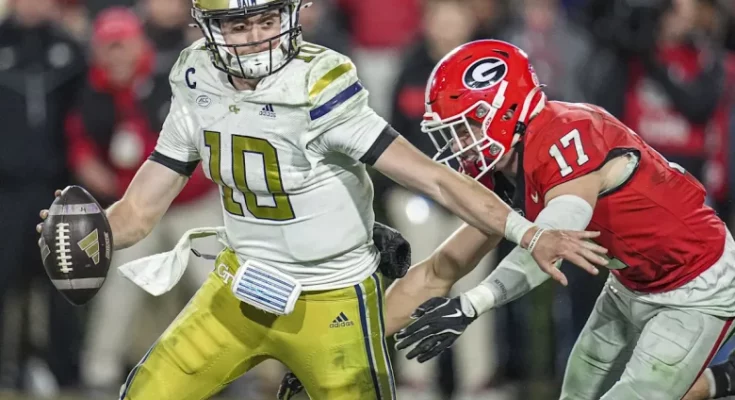Georgia Tech head coach Brent Key didn’t mince words when asked about the possibility of relocating the annual rivalry game between Georgia and Georgia Tech from the traditional campus sites to a neutral venue like Mercedes-Benz Stadium. Key, who embodies the grit and tradition of Georgia Tech football, flatly dismissed the idea, emphasizing the importance of on-campus atmospheres and the legacy embedded in each school’s home turf. But as college football continues its evolution in the age of media rights deals, playoff expansion, and revenue-driven decision-making, even the most entrenched traditions are starting to bend under pressure. Despite Key’s protestations, the argument for moving this heated rivalry to a neutral site like Mercedes-Benz Stadium isn’t without substance—and in many ways, it might actually benefit the University of Georgia more than anyone is willing to admit.
The rivalry between Georgia and Georgia Tech, dubbed “Clean, Old-Fashioned Hate,” dates back to 1893 and is steeped in over a century of animosity, pride, and unforgettable moments. The game alternates annually between Bobby Dodd Stadium in Atlanta and Sanford Stadium in Athens, delivering unique atmospheres that energize fan bases and fuel narratives that span generations. To many purists and alumni, the idea of shifting this rivalry to a neutral venue is nothing short of sacrilege. However, times are changing rapidly in college football, and there are compelling logistical and strategic reasons for considering the relocation—especially from Georgia’s perspective.
Mercedes-Benz Stadium, located in the heart of Atlanta, represents the pinnacle of modern sports infrastructure. Opened in 2017 and home to both the Atlanta Falcons and Atlanta United FC, the stadium boasts state-of-the-art amenities, a climate-controlled environment, a retractable roof, and one of the most impressive video boards in the world. For a program like Georgia, which has national championship aspirations every year and a fanbase that travels exceptionally well, the opportunity to play in such a world-class facility is more than just cosmetic—it’s a strategic advantage.
First, consider the recruiting angle. College football has become a non-stop recruiting war, and programs are constantly seeking any edge to lure elite high school talent. Mercedes-Benz Stadium provides a spectacle that few college venues can rival. Georgia already leverages the stadium for the annual Chick-fil-A Kickoff Games and frequently appears in the SEC Championship Game held there. Prospective recruits from metro Atlanta and beyond are awestruck by the stadium’s grandeur, and Georgia’s familiarity with the venue only strengthens its appeal. Hosting the rivalry game there would allow the Bulldogs to showcase their program on one of the sport’s grandest stages in front of recruits in their own backyard.
Secondly, from a competitive standpoint, Georgia benefits more from neutral-site games than Georgia Tech does. Despite Atlanta being Georgia Tech’s home city, the Bulldogs dominate the fan presence in the area. When the game is held at Bobby Dodd Stadium, it often feels like a home game for Georgia. Moving to Mercedes-Benz Stadium wouldn’t change that—it would only amplify it. The capacity and amenities would favor Georgia’s traveling fanbase, which consistently turns out in massive numbers regardless of venue. The stadium would likely be decked out in red and black, further neutralizing any home-field advantage that Tech might hope to retain.
Moreover, the contrast in facilities between Bobby Dodd Stadium and Mercedes-Benz Stadium cannot be overstated. Bobby Dodd, while historic and scenic with its downtown Atlanta skyline backdrop, is one of the smaller Power Five stadiums with fewer amenities and limited capacity. Mercedes-Benz offers a controlled environment, optimal playing conditions, and a larger stage—something Georgia’s NFL-ready athletes are accustomed to and can exploit. For a team built with national playoff implications in mind, playing in a pro-level stadium could eliminate many of the external variables that come with college venues, such as weather and field condition, giving Georgia’s high-octane roster an even clearer pathway to dominate.
There’s also the issue of revenue. Neutral-site games often yield higher financial returns for both programs due to increased ticket prices, luxury suites, corporate sponsorships, and larger media packages. Georgia, as a brand, commands national attention and would be the bigger draw regardless of where the game is held. By shifting the game to Mercedes-Benz, both schools could potentially generate more revenue than they would with a traditional home-and-home format, particularly with corporate partners looking to associate with high-profile matchups in premier venues.
That said, Brent Key’s resistance is understandable—and even admirable. He’s a Georgia Tech alum who played in this rivalry, and he views Bobby Dodd Stadium as hallowed ground. For Tech, the every-other-year hosting of Georgia is one of the highlights of the schedule, both in terms of fan interest and revenue. Giving that up could feel like a concession of prestige and tradition, something Tech simply cannot afford to do right now as it seeks to rebuild relevance in a competitive ACC and national landscape. The Yellow Jackets gain immeasurable exposure and validation from hosting the Bulldogs, even if the recent results haven’t been favorable. To voluntarily relinquish that would be a tough pill for any Tech supporter to swallow.
But even if the rivalry remains on campus, the specter of Mercedes-Benz Stadium looms large. Georgia’s growing presence in Atlanta and the program’s increased use of the venue for marquee games continue to erode the notion that Tech holds any territorial advantage in the city. Every time Georgia steps into Mercedes-Benz, they’re essentially hosting an away-from-home showcase with elite infrastructure and national attention. The more that happens, the more normalized it becomes—for fans, players, and recruits alike.
Additionally, with the College Football Playoff expanding to 12 teams, the calendar becomes more congested, and teams must manage wear and tear with greater precision. Playing in Mercedes-Benz could serve as a strategic move to control environmental factors late in the season and ensure players stay healthy before potential playoff runs. A domed, neutral setting reduces risks tied to field conditions or inclement weather, and Georgia’s administration is acutely aware of how even minor advantages can compound in championship pursuits.
From a broader perspective, college football is in the middle of a transformation where traditions are increasingly sacrificed at the altar of business and optics. Rivalries that once seemed immovable—like Oklahoma-Nebraska or Texas-Texas A\&M—have been lost or reshaped. Conference realignment has destroyed geographic logic in favor of television markets. Amid this backdrop, moving a rivalry game to a neutral site doesn’t seem as heretical as it once might have. If anything, it fits the emerging playbook: maximize revenue, elevate exposure, and lean into spectacle.
Georgia’s administration is also not blind to the branding opportunities. Playing Georgia Tech in Mercedes-Benz Stadium annually—or even periodically—would allow the Bulldogs to dominate headlines in Atlanta, cement their recruiting foothold, and offer donors and fans a premium experience. It may also serve as a way to increase influence over state politics and city infrastructure partnerships, aligning the program more closely with the business community that surrounds the stadium. These are long-term advantages that could widen the gap between the two programs.
Still, any such shift would likely meet resistance not only from Georgia Tech but from segments of Georgia’s own fanbase as well. For all the bells and whistles of Mercedes-Benz, there is an undeniable charm to Athens on game day. The campus environment, the traditions, the tailgating culture—these are integral to what makes college football special. Swapping that for a sterile, albeit stunning, corporate venue might feel like losing a piece of the sport’s soul. The risk is that the game loses its emotional charge, becoming another packaged event instead of a deeply personal clash.
And therein lies the tension. For Georgia Tech, it’s a matter of identity and dignity. For Georgia, it’s a matter of opportunity and dominance. Brent Key’s defiance is rooted in history, but Georgia’s motivations are tethered to the future. Whether or not the game ever moves to Mercedes-Benz Stadium, the mere discussion of it reflects the evolving priorities of modern college football. And if it ever does happen, there’s little doubt who would stand to gain the most—not the team fighting to protect tradition, but the one already thriving in the sport’s new era of ambition and excess.



